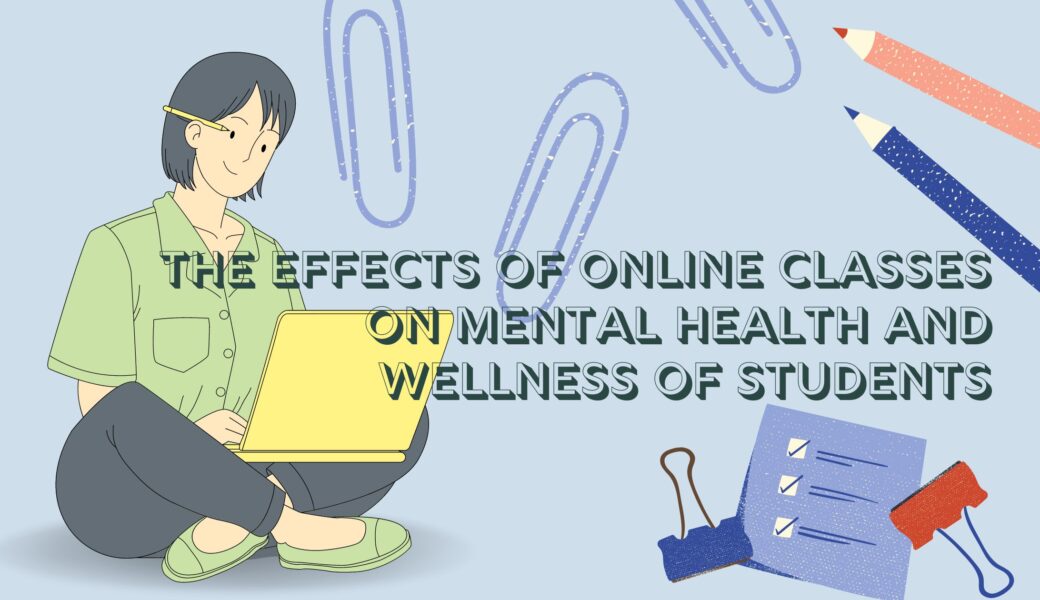The COVID-19 pandemic forced schools and universities all around the globe to switch to online classes. During the epidemic, everyone’s health and safety are of the biggest importance, making online learning the only practical choice. It was first convenient and pleasant. This prevented parents from having to prepare snacks or drive their children to school. Some students even show up to class in their pajamas. However, over time, students, parents, and teachers have come to understand the difficulties of online classes, particularly how they affect students’ mental health and wellness.
On one hand where online classes lessen certain anxiety-provoking factors including commute, peer pressure, and classroom distractions. On the other side, it could make other stressors worse, such as workload, technological difficulties, and time management. In this article, we are going to discuss more about the effects of online classes on a student’s mental health and well-being along with providing some remedies to get of them.
The Symptoms of Mental Health Issues
When you are taking classes online, it is common to suffer some mood and motivation swings. You could have a mental health issue if you experience chronic sadness, anxiety, irritability, or hopelessness or if you start to lose interest in once-enjoyable activities.
Other indicators of mental health problems include trouble concentrating, remembering, or making decisions; adjustments in your sleep, appetite, or energy levels. Along with these, you could also feel physical symptoms like headaches, stomachaches, chest pain, etc. It is crucial to get expert assistance as soon as possible if you notice any of these symptoms. You could also pay someone to take my online class and allow someone else to take your online classes for a while.
How Can Online Classes Affect Mental Health and Wellness?
Imagine what it would be like for a student to spend hours each day in front of Zoom alone, without any recreation or social interaction.
Students who take online classes face a lot of difficulties in their mental health. However, such effects can make them worse if they already have a mental health issue. Here is how they get affected mentally when taking classes online:
- Stress and Anxiety
Since the advent of online learning, there has been a rise in the number of students who experience anxiety and stress. According to data, the mental health of students improved while they were learning online compared to before the epidemic. Now, there is a lot of tension and despair among students as they learn new habits and study techniques. As a result, students frequently put things off and postpone. Consequently, deadlines are missed which makes students feel pressure, worry, and anxiety.
- Online learning Fatigue
Students who feel fully overwhelmed by everything that online education has to offer are likely to experience virtual learning fatigue. Stress and weariness can be increased by using a variety of digital tools while studying and by being exhausted after lectures. They may also affect motivation levels and workflow efficiency. Students find it harder to acquire new material, and despite the fact that they are only sitting in front of a computer, they are physically exhausted.
- Lack of interaction and social isolation
We are social beings who like communicating with others, whether verbally or nonverbally. Working in a group comes naturally to us, and we tend to do better work. As a result, student performance depends on their involvement in class. However, there hasn’t been much social connection since the COVID outbreak, they are feeling lonely. This has a serious effect on a student’s mental health. Due to the lack of social connection, online learning can cause emotions of isolation, lack of motivation, and loneliness.
- Challenges with self-esteem
Students learn a lot through social learning, which is a crucial component of education. Peer learning, learning by doing together, and collaborative learning all have a significant impact on how well children acquire new abilities and develop their self-worth and self-image. They are now struggling with self-esteem difficulties since they lack such deep connections and can no longer find safety in such relationships.
How Can You Look After Your Mental Health and Wellness?
There are several strategies to look after your mental health to reduce the strain of online learning. Following these tips will help students avoid becoming burned out when taking online classes:
- Physical exercises: Physical exercise causes the body to create feel-good hormones that might enhance one’s mental health. Additionally, this will help you relieve mental and emotional tiredness which makes your fresh and active. If your mind is fresh and active, you don’t need to pay someone to take my online class for me as well.
- Make a study area: Having a separate physical area might help kids stay focused and prevent interruptions. Make this area as pleasant as you can by furnishing it with relaxing furnishings, adequate lighting, and all the necessary resources arranged in an orderly manner.
- Nutritious diet: We all strive for instant pleasure, which feels good at the moment but is bad for our health in the long run. As a result, make an effort to ensure that you eat a balanced diet and get enough exercise and sleep. It is necessary for keeping your mind free and active for further classes.
- Make a routine: Making a routine helps you to complete the daily duties set out for you and prevents last-minute scrambling. Maintain a consistent routine by going to bed and waking up at the same time each day. You will feel more productive and less anxious as you organize your daily agenda.
Every aspect of our lives is now connected with technology. Since the pandemic, virtual communication has helped students in continuing their studies, but sadly, not everything is working out as we had anticipated. But as you know that every challenge comes with a solution. The aforementioned tips will help you overcome mental health challenges and help you lead a calm and compose time during online classes.












